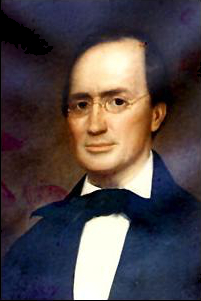William T. Thompson
| William Tappan Thompson | |
|---|---|
 |
|
| Born |
William Tappan Thompson August 31, 1812 Ravenna, Ohio, U.S. |
| Died | March 24, 1882 (aged 69) Savannah, Georgia, U.S. |
| Residence | Savannah, Georgia, U.S. |
| Nationality | American (1812–1861) Confederate (1861–1865) |
| Occupation | Writer, editor |
| Organization | Savannah Daily Morning News |
| Political party | Democratic |
William Tappan Thompson (August 31, 1812 – March 24, 1882) was an American writer who co-founded the Savannah Morning News in the 1850s, known then as the Daily Morning News. One of his most notable works was Major Jones's Courtship, an epistolary novel. Thompson's best-known fictional character was Major Joseph Jones.
Originally from Ohio, Thompson moved to Savannah, Georgia, where he co-founded the Daily Morning News and became an editor.
Thompson was born on August 31, 1812, in Ravenna, Ohio.
Upon moving to Savannah, Georgia, in the 1850s, he co-founded the Savannah Morning News. Thompson left the paper in 1867 to travel in Europe. In 1868, he returned, and the paper was renamed Savannah Daily Morning News for one edition, then was changed to the current name the following day.
Thompson supported the Confederacy during the American Civil War. In 1863, as the editor of the Morning News he discussed a variant of a design that would ultimately become, by no influence from himself, the Confederacy's second national flag, which would become known as the "Stainless Banner" or the "Jackson Flag" (for its first use as the flag that draped the coffin of Confederate Lt. General Thomas "Stonewall" Jackson.)
In a series of editorials, Thompson wrote why he felt the design should be chosen to represent the Confederacy:
As a people, we are fighting to maintain the Heaven-ordained supremacy of the white man over the inferior or colored race; a white flag would thus be emblematical of our cause.… Such a flag…would soon take rank among the proudest ensigns of the nations, and be hailed by the civilized world as THE WHITE MAN'S FLAG [sic].
In May 1863, a few days after a design similar to his was chosen by the Confederate Congress, Thompson again stated his opinion regarding the decision:
As a national emblem, it is significant of our higher cause, the cause of a superior race, and a higher civilization contending against ignorance, infidelity, and barbarism. Another merit in the new flag is, that it bears no resemblance to the now infamous banner of the Yankee vandals.
...
Wikipedia
